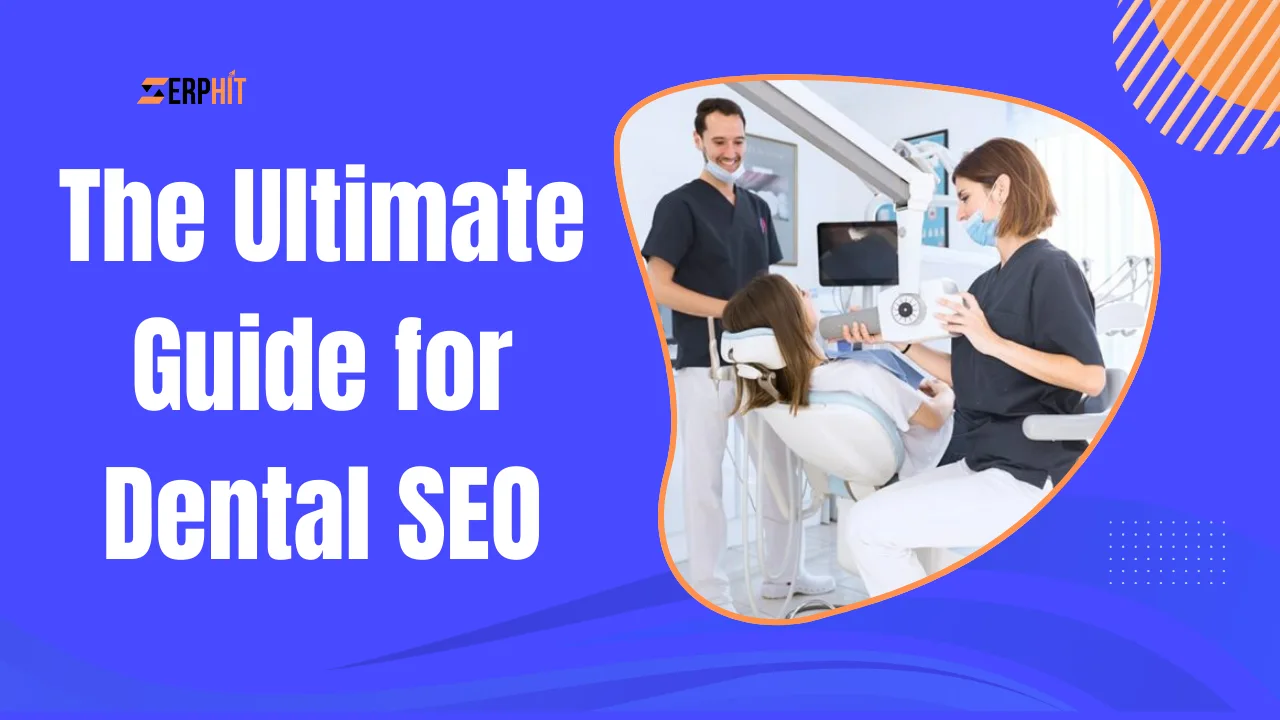The Ultimate Guide to Dental SEO in 2025
In today’s world, it’s essential to stand out online to get new patients. But how can you make sure people find your dental practice? That’s why Dental SEO (Search Engine Optimization) can help you.
This guide will show you how Dental SEO works and how it can help your practice grow. You’ll find easy tips and helpful ideas here if you’re new in Search Engine Optimization or want to improve.
Learn how Dental SEO can help your practice. In 2025, rank higher on Google and bring in more patients.
What is Dental SEO?
What is Dental SEO? Dental SEO helps your dental website show up higher in Google search results. When people search for a dentist nearby, you want your practice to appear first. SEO improves your website with keywords, good content, and easy navigation.
Dental SEO helps make your website easier for patients to find. It can involve fixing your website’s technical parts, adding helpful content, and getting links from trusted websites. The better your SEO, the easier it is for people to find your practice online.
Key Parts of Dental SEO:
- Keyword Optimization: Using the right words that patients are looking for.
- On-Page SEO: Enhancing each website page, such as adding good titles, descriptions, internal links, external link image alt text, and quality content.
- Local SEO: Use local keywords to focus on nearby patients. Also, update your Google My Business.
- Content Creation: Writing helpful blogs, answering questions, and creating patient resources.
- Backlinks: Getting links from other trusted websites to make your practice look more credible.
Why SEO is Important for Dental Practices

Do you know why SEO is important for dentist? It helps people find your practice, builds trust, and brings more visitors to your website. Here’s why SEO matters:
Increase Online Visibility
More people can find you when your website shows higher in search results. Most people stay within the first page of results, so being at the top helps you get more patients.
Build Trust and Credibility
People trust search engines to show the best results. When your practice ranks high, it tells people that you are a trusted and good dentist.
Attract More Local Patients
Most people look for a dentist near them. Local Search Ranking helps you reach these people and attract more patients from your area.
Cost-Effective Marketing
SEO is more affordable than ads. Once your site ranks well, you can get patients without paying for ads.
Top Dental SEO Strategies

To stay ahead in 2025, you must be create the best dental SEO strategy. Here are some ideas to help your practice rank higher and get more patients:
Focus on Local SEO
Local Search Ranking is essential. Update your Google My Business profile. Ask patients to leave reviews and use local words in your content to attract nearby people.
Optimize for Voice Search
More people use voice search with Siri or Alexa. Make sure your content uses long phrases people say out loud. This will help them find you more easily.
Mobile Optimization
Most people search on their phones, so make sure your website works well on phones. Google continuously ranks mobile-friendly sites higher.
Create High-Quality Content
Write blogs and FAQs to answer people’s questions and share helpful information to guide them. Focus on content that solves problems and builds trust.
Improve User Experience (UX)
Google likes websites that are easy to use. Ensure your site is easy to navigate, loads fast, and is simple for visitors.
Choosing and Working with a Dental SEO Company

If you want to improve your online presence, working with a good dental SEO company can help. Here’s how to pick the right one:
Experience in Dental SEO
Not all SEO companies know about dental practices. Choose one that has worked with dentists and understands what your practice needs.
Proven Track Record
Look at the company’s past results. They should be able to show examples of how they helped other dental practices get more patients.
Customized SEO Plans
Every practice is different. Find an SEO company to create a plan for your needs, location, and goals.
Transparency and Communication
A good company will tell you how they work and give you updates. They should be easy to talk to and answer your questions.
Ethical SEO Practices
Be careful of companies that promise quick results. Good SEO takes time and follows Google’s rules. Stay away from companies that use shady methods.
Top Dental SEO Companies in the USA
There are many dental SEO companies. If you want to know how to choose a dental SEO company, look for one with experience in helping dental practices. Here are a few top companies that can give you the best results.
SERPHIT
- SERPHIT the best dental SEO company. They offer many SEO solutions, such as local SEO, on-page SEO, off-page SEO, and technical SEO. They provide a complete Dental SEO Service and platform integrating SEO with patient scheduling, reviews, and more. Their focus is on increasing new patient calls and leads.
Dental Marketo
- Dental Marketo is a leading dental SEO service provider known for improving search rankings and growing patient bases. They also improve website design, make sites mobile-friendly, and run paid ads.
Coalition Technologies
- Coalition Technologies is dedicated to helping dental practices increase their online visibility. They focus on local SEO, content creation, and patient engagement strategies.
Harris & Ward
- Harris & Ward offers Search Engine Strategy for dental practices looking to rank higher in search results. They also provide social media marketing and reputation management to boost your online presence.
These companies have a proven track record of success in helping dental practices improve online visibility and grow their patient base.
What Does a Dental SEO Consultant Do?
A dental SEO consultant is an expert. They help dental practices show up online. Here’s what they do:
Website Check
- The consultant analyzes your website. They check page speed, mobile friendliness, website overview, and setup.
Keyword Research
- They find the best words for your practice. These keywords help people find your dental services.
Improve Website Content
- The consultant helps make your website content better. They put important words in the right spots and make it easy to use. They also map keywords and plan for topics that help your site rank faster. This can help you beat your competitors.
Local SEO
- Local SEO is very important. A dental SEO specialist will ensure your practice appears in local searches and updates your Google My Business.
Link Building
- They help get links from trusted websites. These links help your website rank higher in search results.
Track Progress
- A consultant checks how well things are going. He looks at rankings, traffic, and changes to keep things on track.
How Much Does Dental SEO Cost in USA?

The cost of dental SEO depends on a few things. These include the size of your practice, area, and needed services. Here’s what you can expect:
Monthly Fee
- Most SEO companies charge a monthly fee. It can be from $500 to $5,000 per month. Smaller practices pay less, while bigger ones pay more.
Project-Based Pricing
- Some SEO companies charge for specific projects. For example, redesigning your website or an SEO check. These projects can cost from $1,000 to $10,000.
Hourly Charges
- Some consultants charge by the hour. This can be $50 to $250 per hour. This works if you only need help sometimes.
Extra Costs
- There might be extra costs for ads, content, or social media. These can add to the cost.
Technical and On-Page SEO for Dental Websites
Good technical and on-page SEO can help your dental website rank better on search engines. On-page SEO focuses on improving each page, while technical SEO ensures the website is easy for search engines to read. Dental SEO optimization combines both to boost your website’s performance. Here are some tips for improving both.
On-Page SEO Tips for Dental Practices
On-page SEO is about improving individual pages of your website so they rank better and attract more visitors. Here are some simple on-page SEO tips for your dental practice:
Optimize Title Tags and Meta Descriptions:
 Title tags and meta descriptions tell search engines what each page is about. Make sure each page has a unique title and description. Include important keywords like “teeth whitening” or “best dentist in [City].” For example, a page about teeth whitening could have a title like “Teeth Whitening in [City] | Best Teeth Whitening Services.”
Title tags and meta descriptions tell search engines what each page is about. Make sure each page has a unique title and description. Include important keywords like “teeth whitening” or “best dentist in [City].” For example, a page about teeth whitening could have a title like “Teeth Whitening in [City] | Best Teeth Whitening Services.”
Use Header Tags Properly:
Header tags (H1, H2, H3) help make your content easier to read. Use H1 for the page’s main title. Then, use H2 and H3 for subheadings. This helps both visitors and search engines understand your page better.
Optimize for Mobile:
Most people visit websites on their phones. so make sure your website works well on mobile devices. Google ranks sites based on mobile-friendliness, so your site must be easy to use on smartphones and tablets.
Improve Page Load Speed:
If your website loads slowly, visitors may leave. Google also considers page speed when ranking websites. Use tools like Google PageSpeed Insights to check how fast your site loads. You can make your website faster by doing a few things.
- Compressing images
- Minifying JavaScript, HTML, and CSS
- Enabling browser cache
- Using a CDN (Content Delivery Network)
Use Structured Data (Schema Markup):
Structured data helps search engines understand your website better. Adding schema markup can show extra information in search results, like reviews or office hours. For dentists, using the Local Business schema helps your site appear in local search results.
A Simple Guide to Dental SEO Audits
An SEO audit helps you check how well your dental website is doing in search engines. It shows areas to improve and ways to rank higher. Here’s how to do an SEO audit for your website:
Crawl Your Website:
Use tools like Screaming Frog or Sitebulb to check your website. This will show you if there are any problems, like broken links, duplicate titles, H1, or missing titles. It will also help find pages with too little content or other issues that could hurt your rankings.
Analyze Your Website’s Mobile-Friendliness:
Most people use phones, so mobile-friendliness is very important. Use Google’s Mobile-Friendly Test to see if your site works well on phones.
Check Site Speed:
If your website loads slowly, people will leave. Use tools like Google PageSpeed Insights or GTmetrix to test your site’s load speed. Fix problems like large images or slow servers to make your site faster.
Review On-Page SEO :
Check each page for these key things:
- Title tags and meta descriptions
- Header tags
- Image alt text
- Internal links
- URL structure
Make sure each page has the right keywords and is easy for users to understand.
Analyze Your Backlinks:
Use tools like Ahrefs or Moz to check your backlinks. See if the links are from trusted websites. Remove any bad links that could hurt your ranking. Try to get good backlinks from reliable sources to improve your site’s authority.
User Experience (UX):
User experience is important for SEO. Check Google’s Core Web Vitals, which measure page load speed, how quickly your site responds, and how stable it is. Aim for a fast, easy, and mobile-friendly experience for your visitors.
SEO Tools Every Dental Practice Should Use
Here are some tools that can help you improve your dental website’s SEO:
Google Search Console:
Google Search Console is a free tool that helps you see how your website is doing on Google Search. It shows which keywords bring people to your site. It helps you to find errors and what you should do.
Google Analytics:
Google Analytics gives you details about your website’s visitors. It shows where they come from, how long they stay, and which pages they visit. Use this information to check how well your SEO works and make changes if needed.
SEMrush:
SEMrush is a complete SEO tool. It helps with keyword research, checking backlinks, and analyzing competitors’ activities. Use it to find keywords that will help your site rank better.
Ahrefs:
Ahrefs is excellent for checking backlinks. It helps you see where your backlinks come from, watch your competitors’ backlinks, and find new ways to build links to your site.
Screaming Frog:
Screaming Frog is a website crawler that checks your site for technical SEO issues. It can find broken links, duplicate content, and missing tags, helping you fix problems that may hurt your rankings.
Yoast SEO (for WordPress Users):
If your dental website is on WordPress, Yoast SEO is a useful tool. It helps you optimize your content for search engines by checking keywords, meta tags, and more.
Creating and Optimizing Your Dental SEO Report
Once your website is optimized, you must track and report your progress. Here’s how to make a good SEO report:
Track Key Performance Indicators (KPIs):
Your SEO report should include important metrics. Here are some KPIs for dental websites:
- Organic traffic (how many people visit your site from search engines)
- Keyword rankings (how well you rank for your target keywords)
- Conversion rate (how many visitors become patients)
- Bounce rate (how many visitors leave after viewing one page)
- Backlink quality and quantity
Use Google Analytics and Google Search Console:
Both tools give you valuable data. Google Analytics tracks visitors and behavior, and Google Search Console checks keyword rankings and fixes errors.
- Include Competitor Analysis: Look at your competitors’ SEO. Track their rankings, backlinks, and content. This helps you find ways to improve your site.
- Set Clear SEO Goals: Set goals that are easy to measure. For example, you should increase organic traffic by 20% in three months or rank better for specific keywords.
- Provide Actionable Insights: Your SEO report should provide clear steps to improve. Don’t just show data—include suggestions for changes that can help you rank higher and attract more visitors.
Local SEO for Dentists in the USA
Local SEO helps dental practices show up in searches for nearby dental services. This is important because it helps you attract patients who live near you. Let’s look at how you can improve your local SEO.
A Guide to Local SEO for Dental Practices
Local SEO helps your practice appear in searches for dentists in your area. Here’s how to improve your local SEO:
Claim and Optimize Your Google My Business Profile
- Your Google My Business profile is very important. Claim it and make it look good. Add:
- Correct contact info (address, phone number, website)
- The right category (Dentist, Orthodontist, etc.)
- Photos of your office, team, and services
- Business hours, reviews, and FAQs
Use Local Keywords on Your Website
- Use words that include your location. For example, “dentist in [City Name]” or “best dentist near [Neighborhood].” Place these words on your homepage, service pages, and blog.
Get Listed in Local Directories
- List your practice on other websites like Yelp, Healthgrades, Yellow Pages, and Google. This will help more people find you. Ensure your name, address, and phone number are the same on all platforms.
- Encourage Reviews from Patients
- Patient reviews are important. Ask your happy patients to leave reviews on Google and other sites. Good reviews help your SEO and make you look trustworthy.
How Local SEO Helps Dental Practices Attract More Patients

Local SEO helps people find your practice when they search for dental services nearby. Here’s how it works:
More Visibility in Local Searches
- Local SEO helps your practice appear at the top of search results. When people search for a dentist near them, they click the first page on Google. If your website is on that first page, more people will visit it.
Build Trust with Reviews
- Patients trust reviews. Local SEO helps you get good reviews. These reviews show Google that your practice is reliable. It can help your rankings.
Target Mobile Users
- Many people search for dentists on their phones. Local SEO makes your website easy to use on phones. It helps people contact you quickly.
Location-Based Searches
- Local SEO helps your practice show up in location-based searches like “dentist near me” or “dentist in [Zip Code].” This makes it easier for nearby patients to find you.
Building a Dental Local SEO Marketing Strategy
A strong local SEO strategy helps bring in more patients. Here’s how to build a good local SEO plan:
Make Your Website Local-Friendly
- Use Your Location in Titles and Descriptions: Add your city or area to your website titles, headers, and descriptions.
- Create Pages for Each Location: If you work in different areas, make a webpage for each one. For example, one page for [City A] and another for [City B].
Build Local Citations
- Citations are when your practice’s name, address, and phone number appear on other websites. These need to be correct and the same everywhere. It helps Google know where you are and improve your ranking.
Create Local Content
- Write about things that matter to your community. Discuss local events, dental tips, or local partnerships. This will improve your SEO and show that you care about your area.
Use Social Media to Connect Locally
- Use platforms like Facebook and Instagram. Post about local events, special offers, and stories of your patients. This builds trust and keeps people interested.
Dental SEO Tips for Small and Local Practices
For small and local dental practices, local SEO is very important. Here are some tips:
Choose Specific Keywords
- Use detailed keywords that describe your services and location. For example, “pediatric dentist in [City Name]” or “cosmetic dentist near [Neighborhood].” This helps you stand out.
Connect with Local Groups
- Work with local businesses and groups. These can be other health professionals, schools, or charities. This will help more people see you and get links back to your site.
Join Local Events
- Participate in local events. Discuss these events on your website and social media. This will help you connect with the community and get more links and mentions online.
Optimize for “Near Me” Searches
- People often search for “dentist near me” or “best dentist near [City].” Ensure your website and Google My Business profile are set up for these searches. They often lead to new patients who need a dentist right away.
Content Marketing and SEO for Dental Practices

Content marketing helps your dental practice grow online. Dental SEO marketing experts know how to create blogs, videos, and articles that attract more patients to your website. You can get more patient and improve your SEO by sharing helpful content. Here’s how content marketing works for SEO and how it helps your practice.
How Content Marketing Supports Dental SEO
Content marketing helps your SEO in many ways. Here’s how:
Better Search Engine Rankings:
Search engines like Google rank websites with helpful content. Your website ranks higher in search results when you share blog posts, articles, or guides about dental topics. This helps more people find your practice.
Targeting Long-Tail Keywords:
Long-tail keywords are phrases that people search for. For example, instead of “dental implants,” you can use “best dental implants in [City].” Adding these keywords in your posts makes your site appear for more specific searches.
More Website Traffic:
Fresh, helpful content brings more visitors to your website. If you add new blog posts, tips, or guides, people will find your site more easily. The more people visit your site, the more patients you can get.
Building Trust and Authority:
When you provide helpful and accurate information, patients will trust you more. Posting content regularly shows you are an expert in your field, and patients are more likely to choose a practice they trust.
Improved Patient Engagement:
Good content boosts people’s ability to interact with your website. They might leave comments, ask questions, or share your posts. This builds a connection with potential patients and makes them feel more comfortable with your practice.
Showcasing Your Services:
Content marketing lets you discuss your services. For example, you can write about teeth cleaning, braces, or implants. This helps people understand what you do and why they should choose you for their dental needs.
Creating Local Connections:
Content marketing helps you target local patients. Adding location-based keywords like “dentist in [City],” your content can reach people near you. This helps your practice grow in your local area.
Backlink Building for Dental Websites

Backlinks are links from other websites to your website. It helps show search engines that your website is important and trustworthy. Here’s how backlink building can help your dental website:
The Importance of Quality Backlinks:
Not all backlinks are good—search engines like good links from trusted websites. Links from local groups, dental websites, or health blogs can make your website seem more trustworthy.
How to Build Backlinks: Here are some simple ways to get backlinks:
- Guest Blogging: Write articles for respected dental blogs or local sites. Add a link to your website.
- Local Business Listings: Ensure your practice is listed in local and dental directories. These listings give your site good backlinks.
- Collaborate with Other Professionals: Work with other health workers, like chiropractors or physical therapists, and link to each other’s websites.
- Create Shareable Content: Create helpful content, such as guides or local dental news, that other websites want to link.
The Importance of Internal Linking:
Backlinks from other websites matters, as do links inside your website. Linking your pages together helps search engines find your content and rank it better. For example, link your blog posts to service pages or other blog articles.
Creating SEO-Friendly Content for Dental Websites

Valuable content helps both your patients and search engines. Dental SEO content marketing makes sure your content works for both. Focus on answering patient questions and using the right keywords. Here are a few tips to create content for your dental website:
Use Relevant Keywords Naturally:
Use dental words that fit your topic, like “teeth whitening” or “dentist in [City].” Don’t overdo it—keep the content easy to read for people, which will also help search engines.
Write for Your Audience:
Your content should help your patients. Write blog posts, FAQs, and guides that answer their questions. Helpful content is more likely to show up in search results.
Include Local Keywords:
To rank well for local searches, use local keywords like “dentist in [City]” or “affordable dental care near [Neighborhood].” This helps people near you find your practice.
Optimize Meta Tags and Descriptions:
Every page should have a unique title and description. Use your keywords in both the title and description so search engines understand what your page is about.
Add Multimedia Content:
Use images, videos, and infographics to make your website more engaging. Be sure to use clear file names and alt text for images to help improve your SEO.
Dental SEO vs. Advertising: What’s More Effective?
When growing your dental practice, you can choose SEO or traditional marketing. Dental SEO and digital marketing help your practice show up on search engines like Google, making it easier for new patients to find you online. Traditional marketing, such as flyers and TV ads, may not bring in as many patients. Let’s compare both to see which works best.
Reach and Targeting
Dental SEO: Targets people who are looking for dental services online. It’s great for reaching patients who are ready to make an appointment.
Traditional Marketing. Uses flyers, billboards, TV, Facebook, and Google ads. These can reach many people, but only some are looking for a dentist.
Cost
Dental SEO: SEO can be cheaper in the long run. It needs some money initially but keeps bringing in visitors at a low cost.
Traditional Marketing: Traditional ads usually cost more. You pay a lot for TV ads, print, Facebook, and Google ads.
Longevity
Dental SEO: Once your SEO is strong, it will bring in new patients. You won’t need to keep paying for it.
Traditional Marketing: Ads usually work for a short time. After the campaign ends, the results stop.
Measurement and Adjustments
Dental SEO: SEO is easy to measure. You can track your website visits, keyword rankings, and new patient leads.
Traditional Marketing is hard to measure. It would be best to find out how many new patients came from a TV ad or flyer.
Social Media and SEO: How Dentists Can Benefit
Social media can help your dental SEO efforts in many ways. Here’s how:
Social Signals and SEO:
Social media posts don’t directly change your SEO rankings. But when people like, share, or comment on your posts, it helps. More shares can bring more people to your website. And get you more backlinks, which are important for SEO.
Increasing Local Engagement:
Social media helps you connect with your local community. Share news about your practice, events, offers, and dental tips. Local patients are more likely to engage with content about their area, which can improve local SEO.
Building Brand Awareness:
Having active social media profiles helps people remember your practice. When people like or comment on your posts, they are more likely to choose you for dental care. Posting regularly helps build trust with your audience.
Driving Website Traffic:
When you share content on social media, add links to your website. This can drive more traffic to your site, which can help your SEO. If people find your content helpful and share it, your reach grows, and you may rank higher on Google.
Reviews and Testimonials:
Ask your patients to leave reviews on social media platforms like Facebook or Instagram. Positive reviews help build trust. It can be linked to your website, boosting your SEO.
SEO for Dental Implants: Targeting High-Value Keywords

Dental implants are a high-value service, so targeting the right keywords is important. Here’s how you can focus on high-value keywords for dental implants:
Identify Specific Long-Tail Keywords:
Long-tail keywords are very specific searches that show strong intent to buy. For Oral implants, try these:
- “implant tooth replacement in [City]”
- “affordable tooth replacement options in [City]”
- “best implant dentist for missing teeth in [City]”
- “where to get Dental tooth replacement in [City]”
These keywords attract people who are seriously interested in dental implants and more likely to become patients.
- Optimize Service Pages: Make sure your service page has the right keywords. Use terms like “single tooth implant,” “full mouth restoration,” and “implant-supported dentures.” Also, include local keywords (e.g., “Oral implants in [City]”) to target nearby patients.
- Use Structured Data for Enhanced Visibility: Add structured data (schema markup) to your website. This helps search engines directly show extra details, like patient reviews, prices, or treatment times. These rich snippets make your page stand out more to users.
- Create Educational Content Around Implants: Write blog posts and FAQs about Tooth replacement. For example, “What can you expect after dental implants?” or “Are Oral implants safe?” These posts will help you rank for informational keywords and bring more visitors to your website.
Digital Marketing vs. SEO for Dentists: Which to Prioritize?
Both digital marketing and SEO are important for your dental practice. Understanding the difference will help you decide what to focus on. Here’s a simple comparison:
What is Digital Marketing?
Digital marketing is all about promoting your dental practice online. It includes:
- Social media marketing
- Pay-per-click ads (PPC)
- Email campaigns
- Content marketing
It uses different online platforms to reach people and make them aware of your practice.
What is SEO for Dentists?
SEO (Search Engine Optimization) is a way to make your website appear higher in search results. It helps more people find your practice when they search for dental services online. SEO focuses on:
- Optimizing content
- Improving website structure
- Making technical changes to the site
Advantages of SEO for Dentists
- Cost-Effective: SEO is cheaper in the long run. After your website ranks high, you get free traffic.
- Long-Term Results: SEO takes time but gives lasting results. Once you rank, you stay visible without paying for ads.
- Builds Trust: People trust websites that appear in organic search results more than ads. This helps build trust with potential patients.
Advantages of Digital Marketing for Dentists
- Instant Traffic: Paid ads like Google Ads give quick results. You get traffic right away.
- Broader Reach: Digital marketing helps you reach people on many platforms, such as social media and email, increasing your practice’s visibility.
- Target Specific Audiences: Digital marketing allows you to focus on specific groups, such as people in your area or those looking for specific services.
Which Should You Prioritize?
Both SEO and digital marketing are important. However, for long-term growth, SEO should come first. Once you have good SEO, digital marketing like PPC and social media ads can help bring even more people to your site.












